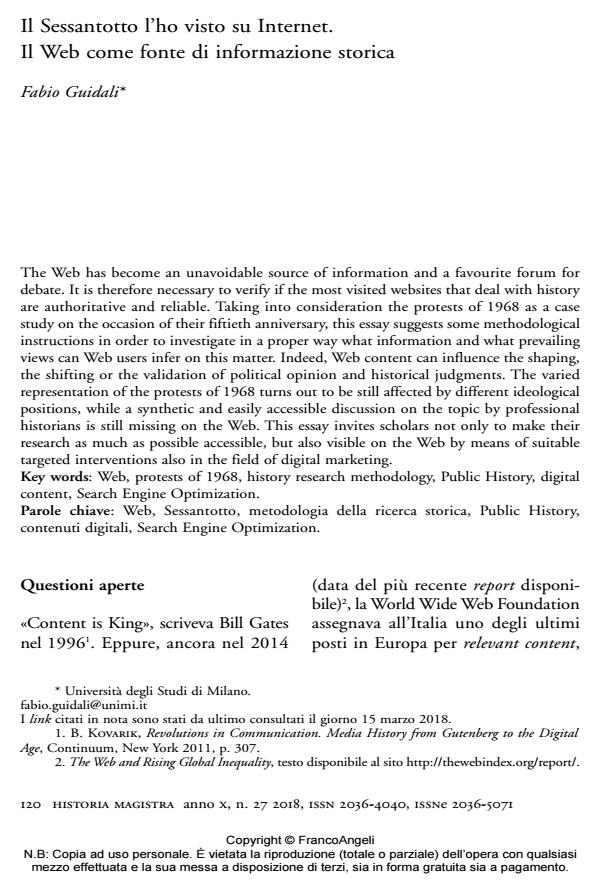Il Sessantotto l’ho visto su Internet. Il Web come fonte di informazione storica
Journal title HISTORIA MAGISTRA
Author/s Fabio Guidali
Publishing Year 2018 Issue 2018/27
Language Italian Pages 14 P. 120-133 File size 104 KB
DOI 10.3280/HM2018-027010
DOI is like a bar code for intellectual property: to have more infomation
click here
Below, you can see the article first page
If you want to buy this article in PDF format, you can do it, following the instructions to buy download credits

FrancoAngeli is member of Publishers International Linking Association, Inc (PILA), a not-for-profit association which run the CrossRef service enabling links to and from online scholarly content.
The Web has become an unavoidable source of information and a favourite forum for debate. It is therefore necessary to verify if the most visited websites that deal with history are authoritative and reliable. Taking into consideration the protests of 1968 as a case study on the occasion of their fiftieth anniversary, this essay suggests some methodological instructions in order to investigate in a proper way what information and what prevailing views can Web users infer on this matter. Indeed, Web content can influence the shaping, the shifting or the validation of political opinion and historical judgments. The varied representation of the protests of 1968 turns out to be still affected by different ideological positions, while a synthetic and easily accessible discussion on the topic by professional historians is still missing on the Web. This essay invites scholars not only to make their research as much as possible accessible, but also visible on the Web by means of suitable targeted interventions also in the field of digital marketing.
Keywords: Web, protests of 1968, history research methodology, Public History, digital content, Search Engine Optimization.
- Beel J., Gipp B. (2010 Academic Search Engine Spam and Google Scholar’s Resilience Against it, in «The Journal of Electronic Publishing», a. 13, n. 3 (dicembre 2010) -- http://dx.doi.org/10.3998/3336451.0013.305.
- Favero C. (2014), Storici digitali in Italia: riflessioni ed esperienze, in «Memoria e Ricerca», a. 22 (2014), n. 47, pp. 183-97.
- Frisch M. (1990), A Shared Authority: Essays on the Craft and Meaning of Oral and Public History, State University of New York Press, Albany.
- Kovarik B. (2011), Revolutions in Communication. Media History from Gutenberg to the Digital Age, New York, Continuum.
- Lazzari M. (2014). Informatica umanistica, McGraw-Hill Education, Milano (seconda edizione).
- Monina G. (2013), Storia digitale. Il dibattito storiografico in Italia, in «Memoria e Ricerca», a. 21, n. 43, pp. 185-202.
- Noiret S. (2015), Storia contemporanea digitale, in Minuti R. (a cura di), Il web e gli studi storici. Guida critica all’uso della rete, Carocci, Roma, pp. 267-300.
- Oppong M. (2014), Verdeckte PR in Wikipedia. Das Weltwissen im Visier von Unternehmen, Otto Brenner Stiftung, Frankfurt am Main.
- Rosenzweig R. (2006), Can History be Open Source? Wikipedia and the Future of the Past, «The Journal of American History», a. 93 (2006), n. 1, pp. 117-46 -- (www.sfu.ca/cmns/courses/2012/801/1-Readings/Rosenzweig-%20Can%20history%20be%20open%20source%20.pdf).
- Spadaro A. (2005), WIKI. Utopie e limiti di una forma di «intelligenza collettiva», in «Civiltà Cattolica», a. 156 (2005), vol. III, n. 3722, pp. 130-38.
- Ventrone A. (2012), Vogliamo tutto. Perché due generazioni hanno creduto nella rivoluzione 1960-1988, Roma-Bari, Laterza.
Fabio Guidali, Il Sessantotto l’ho visto su Internet. Il Web come fonte di informazione storica in "HISTORIA MAGISTRA" 27/2018, pp 120-133, DOI: 10.3280/HM2018-027010